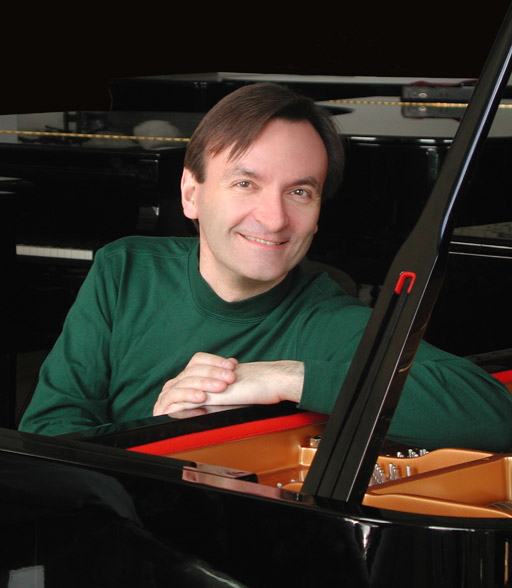Hough brings vision and explosive spontaneity to captivating Miami recital

Stephen Hough performed Sunday night at Gusman Concert Hall in a recital presented by Friends of Chamber Music.
Pianist Stephen Hough’s recital, presented by the Friends of Chamber Music of Miami Sunday evening, was that rare event when a true artist shares something deeper than a performance – a personal vision of what the music conveys – and the audience leaves with a new appreciation of the repertoire.
UM’s Gusman Concert Hall was only half full (one audience member called it “a sin”), but the crowd of amateurs and professional pianists alike were enthralled by Hough’s technical virtuosity and keen musicality. Trim, handsome and lanky, Hough captivated from the moment he began playing, with an immediacy that never let up.
Beethoven’s Piano Sonata in C sharp minor, Op. 27, no. 2, better known as the Moonlight sonata, is too often a dull retread in the hands of lesser musicians. Hough’s performance was thoroughly engrossing. His Adagio sostenuto was surprisingly uneven at first, too fast, then too rubato, until the middle when he settled into a grand melodic arc that ultimately unified the movement. With only the slightest pause, he launched into a spritely Allegretto, with clear dynamic contrasts and exquisite voicing that brought out the larger structure of the work. Again with hardly a breath, he plunged into the Presto Agitato with ferocity, capturing its drive and anxiety while revealing the Presto’s cyclic relationship to the Adagio. His utter control of the instrument’s colors and deep understanding of the work provided a fresh, fascinating rendition.
Afterward, he explained his unusual approach to the opening of the Beethoven by asserting that composer/performers of Beethoven’s era began their concerts by improvising, and the famous Adagio sostenuto is essentially just that. Hough brought a similar improvisatory feel to the beginning of each work, casting them anew, and then broadening them to reveal deeper, circular structures.
Hough’s own Piano Sonata, broken branches, is cast in sixteen brief meditations, each with a unique character but infused overall with a sense of melancholy. Opening with a Prelude built on a mildly dissonant scale, the best of these had a fresh approach to harmony and economic use of materials. Notable were the inquieto section, with arpeggiated bursts of color settling into trills, immenso with a majestic imitative melody, a moto perpetuo malinconico, and the virtuosically diminishing chords of morendo. Much of the material is recast in the later movements, with the Postlude ending the work with a tonal version of the opening Prelude.
Hough followed by attacking the ferocious opening gesture of Scriabin’s Sonata No. 5, and immediately contrasting it a sublimely delicate touch on the gently rocking chords which follow. With effortless, seemingly unlimited technical facility, Hough romped through the most diabolical passages, clearly enjoying himself while profoundly uncovering the underlying relationships in the work.
Hough brought all of this and more to an epic performance of Liszt’s Sonata in B minor, calling it a “symphony for the piano.” From the mysterious pianissimo opening, Hough spun rapid arpeggios into a frenzied, ever increasing spiral of tension. His sense of the long line was clearly evident, yet combined with his improvisatory, searching quality and technical brilliance he conveyed an impression that the music was created in that moment. Liszt’s interconnected themes emerged and receded like recurrent thoughts, and time and again Hough built to blindingly fast peaks, yet naturally brought the music back to a new starting point. Hough’s power comes from energy and the clarity of his musical vision rather than from muscle.
At the end of the concert, where most pianists would be completely spent, he treated the audience to three separate encores: Debussy’s The Girl with the Flaxen Hair, Chopin’s Nocturne Op. 9, no. 2, and an original composition with a Latin flair entitled On Falla. If only all pianists had so much fun in performance, and with so much to say.
Posted Feb 20, 2012 at 6:57 pm by Jeff Turk
Stephen Hough plays Miami and only 300 show up? I agree that it is a sin, but also very scary. Wow…
Posted Feb 21, 2012 at 7:21 am by George W. Rannie
Steven Hough is a real treasure.